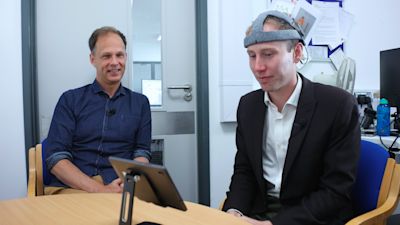Insight
The pioneering dementia test which scientists hope will improve early detection

A pioneering scientist says he is “very hopeful” his new test will improve early detection of Alzheimer’s disease and other forms of dementia.
Dr George Stothart from the University of Bath has spent years developing ‘Fastball EEG’ which he hopes can be rolled out as a screening tool to detect the disease at a far earlier stage.
It involves patients wearing a headset which measures brainwaves while they watch a series of flashing images on a screen for two minutes.
A study in 2021 found it was highly effective at picking up small, subtle changes in brain waves when a person remembers an image. Reduced or missing brain waves can indicate Alzheimer’s disease.
Dr Sothart is now testing to see how accurate it is on a far larger scale, by taking part in a five year project at Southmead Hospital and working with more than 1,000 patients.
Dr Stothart said: “Our hope is that by the end of this study we will have enough data to demonstrate this is sensitive and accurate enough to start building the case that it is included in health care systems.
“I am a scientist so I am fundamentally sceptical, but I am very hopeful. We have done our proof of principle very solidly and soundly.
"We have started from a solid base. But all you can do is collect data at scale and learn more about how well the test works. I’m halfway through the project, let’s see where we are in two years.”
Dementia is currently the biggest cause of death in the UK but diagnosis can often be inaccurate and too late, sometimes up to 20 years after the disease has taken hold.
For the last 40 years, the South West Dementia Brain Bank in Bristol has been trying to help find a cure.
It has received more than 1,300 brain donations which have been used in dementia studies around the world . Yet its work is entirely funded by charities such as Bristol-based BRACE and Alzheimer's Research UK. The data has also helped Dr Stothart develop his Fastball EEG test.
Dr Laura Palmer, who manages the brain bank, explains how dementia actually shrinks the human brain.
She said: “It’s really important for people to see and remember that the reason why people with dementia behave the way they do is because of a loss of brain tissue. It’s a physical disease.
"But because we can’t see it while people are living, it’s quite easy to think about it as a mental condition which you can control - but you can’t.”
Dr Palmer believes we are close to a major breakthrough. She says “prevention” will be possible in her lifetime thanks to the possibility of earlier detection.
Want a quick and expert briefing on the biggest news stories? Listen to our latest podcasts to find out What You Need To Know...